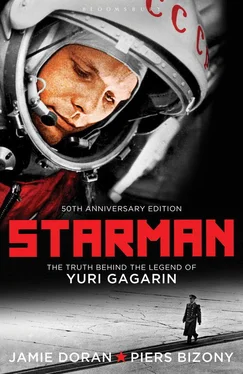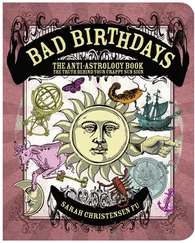In the event, all the Leningrad places were taken. The best available option was at the Lyubertsy Steel Plant in Moscow, which incorporated a school for apprentices. Here Yuri could learn a proper trade – steel foundryman. There was much pulling of strings with relatives on his father’s side of the family for interviews, references, accommodation. In 1950 Yuri was finally accepted as an apprentice and went off to Moscow, where Uncle Savely Ivanovich agreed to let him stay with them for a while.
At Lyubertsy, Yuri Alexeyevich Gagarin received his first adult uniform: a foundryman’s peaked cap with a union emblem; a baggy tunic of cardboard-stiff serge, with the sleeves much too long; dark baggy trousers; and a wide leather belt with a big brass buckle. He looked at himself in the mirror and decided that his comical outfit was worth a picture. He spent his last few roubles sending a photograph back home.
Gagarin’s foreman at Lyubertsy, Vladimir Gorinshtein, was a dour, heavy-set man with a drooping moustache and bulging muscles, and a tongue on him as scalding as the molten steel he so loved to work with. ‘Get used to handling fire,’ he would say to his cowering apprentices. ‘Fire is strong, water is stronger than fire, the earth stronger than water, but man is the strongest of all!’ [4] Ibid., p. 90.
‘We were scared,’ Gagarin recalled in a 1961 interview.
His first assignment was to insert hinge-pins into the lids of newly assembled metal flasks. The walrus-faced foreman strode across to inspect the work. By beating his fists against his forehead and swearing mightily, he was able to hint that Gagarin had installed his pins completely the wrong way round. ‘The next day we all made better progress,’ Gagarin recalled. By his own admission, this was typical for him. He had no particular knack for getting things right the first time. He had to work quite hard at his tasks, practising them repeatedly. In a brief interview given many years later, Gorinshtein said:
At first Yura struck me as too small and frail. The only vacancy I had available was in the foundry group, which meant a lot of smoke, dust, heat and heavy lifting. I thought it would be beyond him. I can’t remember why I eventually ignored all these negative points and accepted him. It must have been the determination you could feel in him. Was he special? No, but he was hard-working. [5] Golovanov, Our Gagarin , p. 42.
Gagarin’s year-end report from the foreman was good. In fact, he was one of only four apprentices to be selected for training at a newly built Technical School in Saratov, a city port on the great Volga river. Here he would learn the intimate secrets of Russia’s most important machine: the tractor.
In the spring of 1951 Yuri and his three lucky companions from Lyubertsy were escorted to Saratov by their new teacher, Timofei Nikiforov. Within a few hours of their arrival in the town, Gagarin saw a notice. ‘AeroClub’ it read. ‘Ah, my friends. That would be something. To get in there!’ His companions laughed, but a few days later the club accepted his application to join. To his dismay, Gagarin found that the Technical School kept him relentlessly occupied, and it was several weeks before he could actually go to the club’s airfield on the outskirts of Saratov.
Dmitry Martyanov, the club’s war-veteran chief of training, saw Gagarin for the first time as a young man with a rapturous expression on his face gazing at an old canvas-clad Yak-18 training plane, so he strolled across and offered to take him for a brief trip into the air. They went up to 1,500 metres, crawled through the sky at 100 kmph, and came back down to earth after a few minutes. ‘That first flight filled me with pride, and gave meaning to my whole life,’ Gagarin recalled.
Martyanov said, ‘You handled that very well. One would think you’d done this before.’
‘Oh, I’ve been flying all my life,’ Gagarin replied. [6] Burchett & Purdy, Cosmonaut Yuri Gagarin , p. 91.
Apparently Martyanov knew exactly what he meant, and he became a firm friend from that moment.
In the spring of 1955 21-year-old Yuri graduated with an ‘excellent’ grade from Saratov Technical School. By this time his interest in tractors was waning. He had spent the previous summer at the AeroClub learning to fly the Yak-18. After his first solo jaunt, he gave his friend and tutor Martyanov a pack of Troika cigarettes, a sort of traditional pilot’s gift. But it wasn’t all fun and games. He had to attend evening lectures in aviation theory, while keeping awake in the daytime for Technical School. He ploughed through the extra workload, determined not to fail. His reward at the club was to make a hair-raising parachute jump from the wing of a plane. Martyanov also recommended Gagarin for the Pilots’ School at Orenburg, on the Ural River. Of course Gagarin would have to sign up as a military cadet, if he wanted to get in there. Orenburg was not some cosy little ‘club’, but a deadly-serious training centre for military fliers; though it has to be said that the AeroClub wasn’t exactly for fun, either. In Soviet society, ‘fun’ was a difficult concept to grasp. Better to say: at the AeroClub eligible citizens could volunteer informally to practise a useful skill.
At the very least, ‘fun’ was supposed to keep you fit for work. Gagarin signed up with various sports clubs in Saratov and built up his small, undernourished frame with plenty of exercise and food. He played volleyball and basketball, and showed off to pretty girls sitting on the banks of the Volga how he could water-ski on one leg. If he fell off and clambered to shore wet and grinning, that seemed to impress them just the same. He had grown into a very fine-looking and confident young man, albeit slightly shorter than average and better suited for acrobatic rather than sprint sports. His good-natured charm and generous humour won him many friends.
The tutors at Orenburg were not so easily charmed. They were soldiers on active duty. Gagarin would have to commit to their discipline for years to come and, after they had finished with him, they might send him away to fight and be killed. Anna and Alexei Gagarin expressed dismay at the thought of their boy enlisting with the military, and this obsession with aircraft seemed reckless. However, Alexander Sidorov, a fellow member of the Saratov AeroClub, recalled in 1978 that Gagarin already had the keen self-discipline expected of a future military pilot:
On overnight stays at the Saratov airfield, Yuri would zealously ensure that our camp tent was kept perfectly tidy. He couldn’t bear untidy or slovenly people. At first he’d appeal to their consciences in a friendly way, but if that didn’t work he would demand in stronger terms. [7] Golovanov, Our Gagarin , p. 43.
It was not easy to score top marks at Orenburg. Yadkar Akbulatov, a senior instructor, said in 1961, ‘Don’t imagine that Yuri was an infallible cadet, a child prodigy. He wasn’t. He was an impetuous, enthusiastic young man who made the same slips as any other.’ His worst marks were for his landings. He was in danger of failing Orenburg completely if he could not get his aircraft down without bouncing on his tyres. Akbulatov flew with him a couple of times to see if they could iron out some faults. ‘I took him up and watched him carefully. On steep banking turns his performance wasn’t absolutely perfect, but in vertical dives and climbs he put on a show that made me see stars from the g-load. Then came the touchdown. It was faultless! I asked him, “Why can’t you always land like that?” He grinned and said, “I’ve found the solution.” He put a cushion under his seat so that he could get a better line of sight with the runway.’ From now on, Gagarin never flew any aircraft without his cushion. [8] Burchett & Purdy, Cosmonaut Yuri Gagarin , pp. 92–3.
Читать дальше












